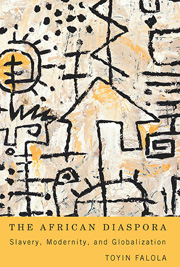Book contents
- Frontmatter
- Dedication
- Contents
- Preface and Acknowledgments
- Introduction: The Old and New African Diaspora
- Part 1 The Old Diaspora: Slavery and Identity Politics
- Part 2 An African Case Study: Yoruba Ethnicity in the Diaspora
- 5 Atlantic Yoruba and the Expanding Frontiers of Yoruba Culture and Politics
- 6 Politics, Slavery, Servitude, and the Construction of Yoruba Identity
- 7 Orisa Music, Dance, and Modernity
- Part 3 The New Diaspora: Transnationalism and Globalization
- Postscript: United States Foreign Policy on Africa in the Twenty-First Century
- Notes
- Bibliography
- Index
7 - Orisa Music, Dance, and Modernity
from Part 2 - An African Case Study: Yoruba Ethnicity in the Diaspora
Published online by Cambridge University Press: 05 September 2013
- Frontmatter
- Dedication
- Contents
- Preface and Acknowledgments
- Introduction: The Old and New African Diaspora
- Part 1 The Old Diaspora: Slavery and Identity Politics
- Part 2 An African Case Study: Yoruba Ethnicity in the Diaspora
- 5 Atlantic Yoruba and the Expanding Frontiers of Yoruba Culture and Politics
- 6 Politics, Slavery, Servitude, and the Construction of Yoruba Identity
- 7 Orisa Music, Dance, and Modernity
- Part 3 The New Diaspora: Transnationalism and Globalization
- Postscript: United States Foreign Policy on Africa in the Twenty-First Century
- Notes
- Bibliography
- Index
Summary
Music and dance present both the public and private faces of African gods and goddesses. They create limitless opportunities to express emotions and aspirations in diverse settings and scattered locations. They have served as agencies of resistance and cultural nationalism during slavery, colonial domination, and thereafter in all places where the black experience has been shaped by domination, oppression, and exploitation. Orisa music and dance assault the entangling indignities brought on by commerce and mammon. In racialized contexts, most notably in the Americas and Europe, they add to how the boundaries of race are created and negotiated—indeed, they even create a moral order for blackness and for castigating oppression and those who participate in it. Through music and dance, Africans have been able to reinscribe their Africanness and identity in hostile, racialized environments, and women have particularly found a source of power to reinscribe their femininity in patriarchal spaces.
Whether in Africa, the Americas, or other places where Orisa traditions have spread, we have a deeply rooted ethnography that depicts the minds of black beings: recording and performing lived experiences, capturing the mental milieu in which they exist, and verbalizing the texts of their inner feelings. Renditions and performances expose the activities of human beings, the character of nature, and the relationships between human beings and the spiritual forces that shape their minds and actions. We use music and dance to publicize the confrontations within us, confrontations between us and others, and our ongoing dialogue with the universe.
- Type
- Chapter
- Information
- The African DiasporaSlavery, Modernity, and Globalization, pp. 187 - 210Publisher: Boydell & BrewerPrint publication year: 2013



